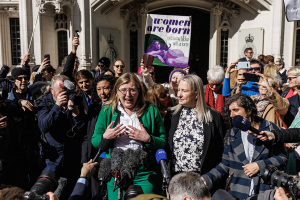Lutherans Stress Full Communion Over 'Lutheran-Centric' Body
Some 500 people from around the world have convened to celebrate the 60th anniversary of the Lutheran World Federation on Sunday.
The celebration of the largest Lutheran body, which claims nearly 66.7 million members, takes place in Lund, Sweden, where an eight-day global Council meeting is underway.
Around the theme "Living in Communion in the World Today," LWF President Bishop Mark S. Hanson highlighted the shift in focus from living as Lutherans to living in the world, including a greater emphasis on ecumenical relationships.
"The dynamic of communion is inherently border-crossing, reconciling universal so one could easily wonder how there could be any justification for a specifically Lutheran communion of churches.
"Isn't it a problematic distraction from or even barrier to the goal of full ecumenical communion? That would be true if ... we were simply 'Lutheran-centric,'" Hanson stated on Wednesday at the Council meeting, which opened March 20.
"If our communion is life-overflowing ... then a Lutheran communion can exercise a profound ecumenical vocation," added Hanson, also presiding bishop of the second largest Lutheran church - Evangelical Lutheran Church in America.
General Secretary the Rev. Dr. Ishmael Noko also stressed the need for broader ecumenical dialogue, especially as Lutherans face debates around such issues as marriage, family and sexuality.
"Our credibility as Lutheran churches is constantly undermined by the fact that we are not in pulpit and altar fellowship with each other in spite of the common confessional writings. This persistent division gives the impression that there are other reasons that divide us rather than confessional stands," said Noko on Thursday as he urged churches to build bridges of healing.
Noko also pointed out that LWF's engagement in bilateral dialogues had led to new avenues of reflection and practice, which justified why new phases of dialogues, even with traditional partners were being established, according to a press release. New dialogue commissions were set up with the Anglican Communion and the World Alliance of Reformed Churches, he noted, and new stages are being explored in these relationships.
Last summer, Noko had joined Methodists and Roman Catholics in Seoul, South Korea, to sign a historical triparted agreement on justification. The unprecedented move represented opened doors for future ecumenical relationships and a "full visible unity in faith," as Pope Benedict XVI called it, according to Cardinal Walter Kasper.
While the Lutheran body looks toward a new stage in ecumenical participation with world communions, Hanson noted that living a full communion relationship would not be easy. It would mean challenging old assumptions, listening to one another, and becoming accountable to others with different angles of vision with different insights, blind spots, strengths and temptation, he said.
Despite the challenges, Hanson stressed the benefits of full communion.
"Together we can discover how to speak the gospel more truly. Together we can challenge each other to engage in God's mission more courageously. Together through the eyes of others we will begin to see ourselves more clearly, even critically."
The LWF Council Meeting and Church Leadership Consultation The 60th anniversary celebration is scheduled for live broadcast on the Internet.
On the web: Council video streaming





























